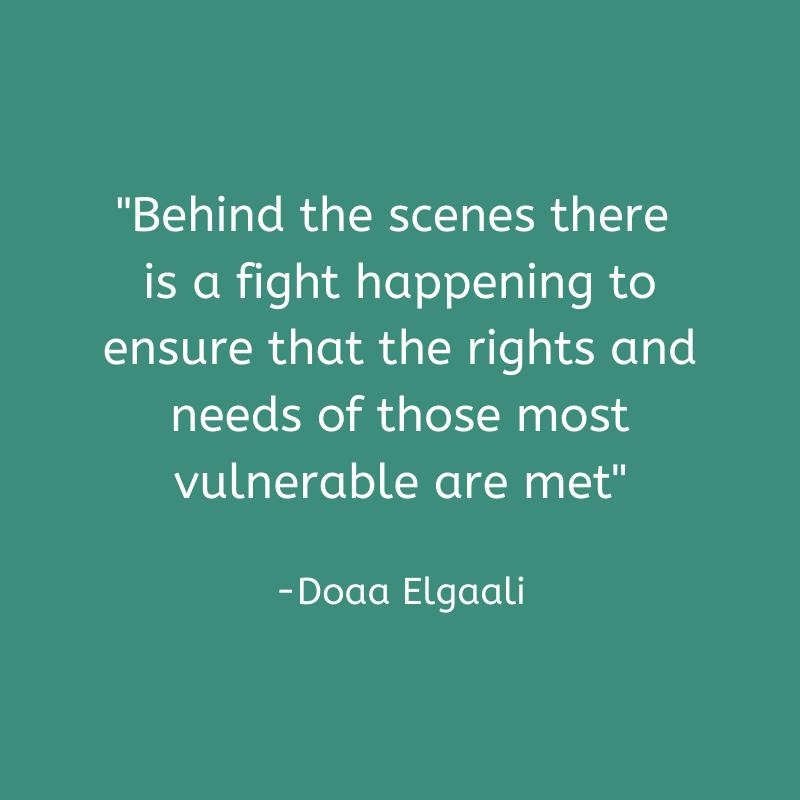#UMNMCH student Doaa Elgaali MPH 2021 wrote this reflection on how her coursework, internships, field experience, and culminating experience have all contributed to her career in MCH.

Throughout my undergraduate years, policy and government work was not something that had caught my interest. In contrast, it always seemed too complicated, which scared me away. This is why I challenged myself during my first semester of graduate school to apply for a deployment with the Division of Child and Family Health with the Minnesota Department of Health (MDH).
My time at MDH enhanced my knowledge of how state systems work, especially when it comes to funding allocation for different programs. Every five years, MDH completes an assessment of the health of children, mothers, and families in order to identify statewide priorities and eventually allocate funding. A mixed methods approach is used to complete the assessment. Before joining the team, there was a Needs Assessment Team that conducted a literature review and examined previous reports and dashboards to understand the health and needs of children, mothers, and families. Afterwards, a survey was administered to 2800 individuals to give their input in what they believed were the unmet needs of women and children in Minnesota. Hence, our first task was to analyze the survey responses and draw major themes. The top 5 themes that were mentioned were concerning Childcare, Housing, Accessible and Affordable Healthcare, Financial Security, and Mental Well-being. Then, my main task was to write, review, and edit briefs across the 6 MCH domains with the supervision of Blair Harrison and Molly Meyer. These include maternal health, infant health, child health, adolescent health, and children and youth with special healthcare needs (CYSHN). Writing the briefs required intense research to better understand each topic and provide accurate data. We then held meetings with subject matter experts to better enhance our understanding and provide well-informed briefs. This really taught me how often-times, what is found in paper can be different than reality. For example, breastfeeding is one of the concerns under maternal and child health. When looking at the state data, Blacks have drastically lower rates of breastfeeding, showing the need for intervention. Once this was discussed with subject matter experts, it became evident that even though both fall under the Black category; African Americans have low rates while African immigrants have above average rates of breastfeeding. This calls for an intervention that focuses on African Americans so that resources are allocated effectively. This highlights the importance of always including the voices of those already doing the work.

Upon completing my deployment, I gained a better understanding of how the state system works and I am now more equipped to navigate a once mysterious system. I was also once reminded of the importance of listening to communities and working with them to meet their needs. In everyday politics, maternal and child health may not be at the forefront. However, behind the scenes there is a fight happening to ensure that the rights and needs of those most vulnerable are met.
Doaa Elgaali is a second year MCH MPH student. Doaa completed her undergraduate degree in Social Work with minors in Psychology and Global Health from the University of Iowa. She recently accepted a Child Welfare Data Analyst upon completing her deployment position in the Title V section of the Minnesota Department of Health (MDH). In her spare time, Doaa enjoys spending quality time with family and friends, hiking, and trying new restaurants with her husband. After graduating, Doaa hopes to establish a career in public health policy and administration with a focus on disadvantaged populations where she can promote maternal and child health on a macro-level.
–Read Student Spotlight archives
Interested in learning more about getting a degree in MCH? Visit our MCH Program page for more information.
#UMNMCH #UMNproud #UMNdriven